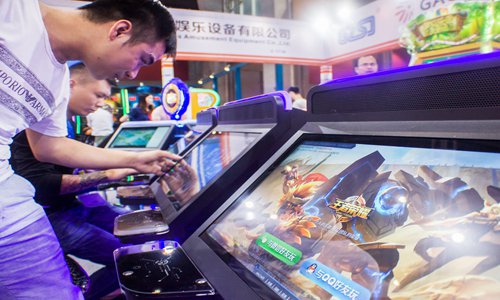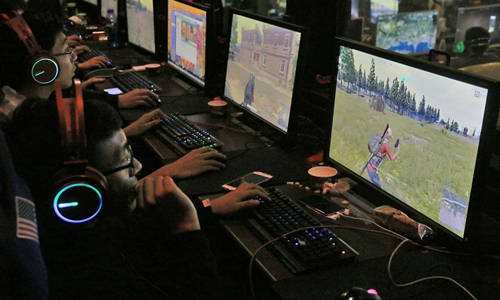Chinese game stocks recoup some losses as market recovers from panic selling
Market recovers from panic selling, pares losses

Visitors play the Honor of Kings, one of the most popular games in China, at the Game Time International Asia China Expo at Guangzhou, South China's Guangdong Province in September 2018. Photo: VCG
Chinese gaming companies recouped some of their losses on the stock market Wednesday as the market recovered from a sell-off in the previous trading day, when online games were classified as "spiritual opium".
Major gaming firms pared some of their heavy losses after top companies and industry associations vowed fresh measures to curb "gaming addiction" among China's youth.
Tencent Holdings rose 2.42 percent to close at HK$456.8 ($58.75) after plunging 6.11 percent on Tuesday. NetEase shares shed 1.58 percent to finish at HK$143.6, after plummeting 7.77 percent on Tuesday.
Shenzhen-listed Perfect World's stock price edged down 0.39 percent to close at 15.34 yuan ($2.37) on Wednesday, easing from a loss of 5.29 percent on Tuesday. Wuhu 37 Interactive Entertainment Network Technology, traded at Shenzhen stock exchange, gained 0.37 percent after losing 5.61 percent on Tuesday.
There were also signs of an improvement in US-listed Chinese gaming stocks such as HUYA. After diving 8.35 percent on Tuesday, the New York Stock Exchange-traded game live-streaming platform saw its shares rise in pre-market trading on Wednesday.
The gaming sector took a battering over investors' reaction to possible tougher regulations, although it's not clear what curbs may be imposed, Yang Delong, chief economist at Shenzhen-based First Seafront Fund Management Co, told the Global Times on Wednesday.
The recovery came after a market bloodshed on Tuesday, when Tencent's flagship video game Honor of Kings was singled out in a much-cited article by the Economic Information Daily, a publication affiliated with the Xinhua News Agency, which called online games "spiritual opium" and "electronic drugs". The resultant impact on teenagers' physical and mental health should not be underestimated, the article remarked.
It pointed out that more than half of the country's children and teenagers suffered from near-sightedness in 2020, while addiction to online gaming affected their academic performance and has been linked to the development of personality disorders.
The broadside sparked a bashing of gaming stocks in both the Chinese mainland and Hong Kong.
As Yang put it, recent wild swings in private education stocks amid the country's sweeping push against after-school tutoring seem to have put investors on edge.
The article later disappeared from the daily's website and its official WeChat account on Tuesday.
Still, the China Game Publishers Association Publications Committee (GPC) said on Tuesday that it will accelerate the launch of an age-rating system on whole game products and urge gaming firms to develop content appropriate for players of certain age.
When the pilot work is mature, the age-rating system will also be included as part of an audit system.
Tencent on Wednesday announced plans to further cut the time young people are spending playing the popular title Honor of Kings on Wednesday. Players under 12 will be prohibited from spending money in the game, and time restrictions for minors will be tightened to one hour on non-holidays and two hours on holidays.
Minors are also prohibited from playing the game between 10 pm and 8 am, according to an upgraded system announcement sent through the game.
Market observers warned against overreacting to tightening as part of broad-based efforts to ensure healthy lives for minors.
The new measures, intended to rein in minors' access to gaming, would ensure their physical health as well as steady economic development, according to Yang, who said investors shouldn't read too much into these moves that aim for healthier growth.
The market is rebounding from earlier unnecessary panic, said Liu Dingding, a Beijing-based independent analyst.
"The fundamentals of China's gaming industry remain intact and the sector will continue its high growth," Liu told the Global Times on Wednesday.
"Instead of being 'electronic opium', games can serve as important conduit for the exports of a country's cultural self-confidence," he continued, noting that the key to making the best of the gaming sector lies in the country's capability to oversee gaming practices.


